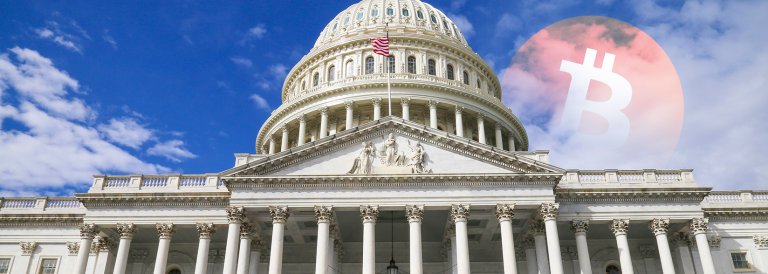 Two new cryptocurrency bills from US Congress aim to create competitive regulation and prevent market manipulation
Two new cryptocurrency bills from US Congress aim to create competitive regulation and prevent market manipulation Two new cryptocurrency bills from US Congress aim to create competitive regulation and prevent market manipulation

Cover art/illustration via CryptoSlate. Image includes combined content which may include AI-generated content.
Two pro-cryptocurrency bills were introduced to the US House requesting the CFTC, in consultation with the SEC, produce reports to inform lawmakers about crypto. The bills aim to gather information on how to encourage adoption of cryptocurrencies, create more competitive regulation, improve laws for crypto exchanges, and prevent price manipulation.
Pro-Cryptocurrency Bills Introduced to House of Representatives
On Jan. 30th, 2019, two bills were introduced to the US House of Representatives, the US Virtual Currency Market and Regulatory Competitiveness Act of 2019 and the Virtual Currency Consumer Protection Act of 2019.
Both bills would compel the chairman of the Commodity Futures Trading Commission (CFTC)— in consultation with the Securities Exchange Commission (SEC) chairman—to submit a report with recommendations and policy prescriptions around cryptocurrency to several Congressional committees, including those responsible for banking and financial services.
Ultimately, these Congressional committees would provide specialized guidance to Congress to produce better and more informed legislation.
“Virtual currency could have a significant effect on the economy, and regulation of them may be important to protect investors, deter bad actors, create market certainty, and ensure American competitiveness in an evolving global marketplace,” according to the bills.
Virtual Currency Market and Regulatory Competitiveness Act
The first bill, if passed, would require the CFTC to produce a report providing recommendations on making US cryptocurrency regulations more competitive internationally while encouraging the adoption and the growth of virtual currencies.

Additionally, the bill asks the CFTC to clarify which cryptocurrencies qualify as commodities—and thus not securities—and clear definitions around this category.
Lastly, the first bill asks for guidance on creating a better regulatory structure for cryptocurrency exchanges, including Federal licenses, market supervision, and consumer protection.
These rules would potentially take priority over State money transmission licensing, and if so it would allow crypto exchanges to operate more easily across the entire US.
Preventing Market Manipulation
The second bill requests the CFTC produce a similar report on ways to “promote fair and transparent virtual currency markets by examining the potential for price manipulation.”
The bill requests information including explanations on methods used to manipulate the price of cryptocurrencies, which cryptos are susceptible to being manipulated, and the potential impact on investors if price manipulation occurs.
The bill also requests information on the extent to which the CFTC can conduct “market surveillance of virtual currencies for signs of manipulation” and the “enforcement of Federal regulation against persons involved in any such manipulation.”
Congress People Behind the Bills
Both bills are a bi-partisan effort spearheaded by a core of three congressmen. Democrat Darren Soto (FL) and Republicans Ted Budd (NC) and Warren Davidson (OH).
Davidson and Soto were also involved with the introduction of an earlier pro-crypto bill, the “Token Taxonomy Act,” which would clarify how cryptocurrencies would fit within the SEC’s regulatory framework.

Meanwhile, Democrat Bonnie Watson Coleman (NJ) was only involved with the introduction of the Consumer Protection Act while Republican Tom Emmer (MN) was only involved with the Regulatory Competitiveness Act.
Overall, these bills aim to gather information and recommendations from the CTF, SEC, and other regulatory bodies on the best ways to tackle cryptocurrency regulation. Furthermore, the text of these bills suggests that this group of Congresspeople is looking to change legislation to promote growth in the industry while protecting investors.



 CoinGlass
CoinGlass  Arkham Intelligence
Arkham Intelligence 













































































